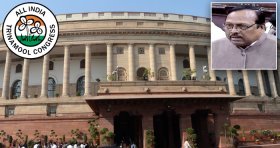January 2, 2018
Sukhendu Sekhar Roy speaks on The Insolvency and Bankruptcy Code (Amendment) Bill, 2017

FULL TRANSCRIPT
Sir, so far The Insolvency and Bankruptcy Code (Amendment) Bill, 2017 is concerned, we will move two amendments. First of all, in regard to Clause 5 of the Bill which proposes the insertion of Section 29 A, and Clause 3 that is very relevant, because it disqualifies persons who hold accounts that have been considered as NPAs, and at least one year has passed between the date of such classification and the date date of commencement of insolvency resolution process.
Sir, this provision does not take into account the fact that not all bad accounts are willful. There is a sharp difference between the bad loans and the willful defaulters. There are so many bad loans because despite the good intent of the borrower, they could not pay back the loan because of the market factor or some other unforeseen factors. The government must take into account the intention.
Now, who is a willful defaulter? The RBI in its circular dated July 1, 2015, has categorised the willful defaulters. Though the unit who has obligations to the lender even when it has the capacity to order the said obligation, but has defaulters, the unit which has defaulted and not utilised the finance from the lender for the specific purpose for which the loan was taken. Next, the unit which has defaulted and siphoned off the funds, so the unit which has disposed off, or removed the moveable fixed asset or removable property given for the purpose of securing a term loan without the knowledge of the bank. These are the companies, or the people who have been characterised as willful defaulters as per the RBI Act.
Sir, this circular of RBI has also advocated for penal measures against the willful defaulters. The RBI has said the lenders i.e., banks may initiate criminal proceedings against willful defaulters wherever necessary. I do not know in how many cases penal action or, criminal proceedings have been initiated against willful defaulters. On the contrary, before the Apex Court, government has given a sealed cover giving a list of the willful defaulters with the plea that their identity should not be disclosed and for that matter, The RBI Act of 1931 or, Banking Regulation Act of 1949 have not been amended for disclosure of the identities of such willful defaulters, sorry to say.
Therefore, according to us there should be sharp difference between the bad loan accounts and the willful defaulters, which have not been given credence by the government in the proposed amendment.
Secondly, Sir, 29(a) Clause (h) disqualifies persons who have executed a guarantee in respect of a company against which a application for insolvency resolution has been admitted for submitting a resolution plan.
This provision is also too wide because even guarantors who have failed to honour a guarantee executed can be taken into account, but those whose guarantees have not been invoked at all by the guarantor, can be treated in the same manner against those who have given a guarantee and failed to honour a guarantee. Therefore, my suggestion before the government would be that this provision is too wide and there is no rationale behind disqualifying the persons.
The third provision is related to home buyers, about a perennial problem home buyers are facing. Now, there is no reasonable classification to keep home buyers out of the category of operational creditors nor does such a classification have any nexus with the object of the court. If we go through the judgement of the parent court, the objects and reasons given, there is no nexus with the objects and reasons of the parent court so far as the home buyers are concerned because they do not come in the category of secured creditors or operational creditors.
Now, my suggestion to the government is that the government should take note of the fact that the home buyers and the operational creditors would stand together in queue in case of liquidation of a builder’s company. Nowadays, we find so many builder companies that have defaulted. They have not handed over the flats and houses to the home buyers, who have deposited money with these companies. They are being cheated, and in some cases, even the apex court had to intervene. But there is no such provision in the Amendment or in the parent court’s judgement that the home buyers should also come under the definition of operational creditors; otherwise their interest will be jeopardised.
In our country, there are thousands and thousands of home buyers, and many of them do not know where to go or how to resolve the disputes. Some people are going to the consumer forum while others are going to different courts, and now, with the introduction of the Bill and the Amendment thereof, the interests of home buyers would be compromised.
Before I conclude, Sir, while the provisions of the Bill do not appear to apply to resolutions admitted by the NCLT, this may create a problematic situation for the famous Synergies Dooray case where the debtor company was merged with a related party itself while undertaking a 95 per cent haircut. That is the area where the government should pay more attention. Why are we not attaching the names of the group companies of the wilful defaulters? Let the properties of the group companies of the wilful defaulters also be attached, and their identities be disclosed.
If the government has good intentions, of giving good relief to the people, then those who have plundered public money should be brought to book and thereafter, certain other categories of people should be brought to book. This is my humble submission through you, Sir, to the government.
Thank you.
